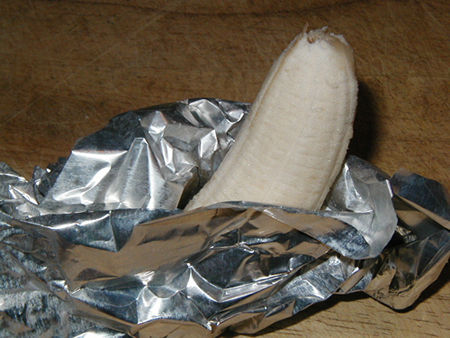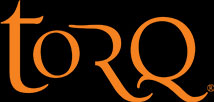This isn’t exactly groundbreaking research, but it’s a flippin’ good idea. I owe it all to Tanya Black, one of my Personal Training clients who bravely tolerates the challenging little exercise routines I subject her to on a weekly basis. She does share the agony and ecstasy of physical exercise with her husband Steven though, so at least they each have a shoulder to cry on at the end of the day.
Well, as we were about to part company last Thursday, I had a frozen banana thrust into my hand, wrapped up in tin foil. ‘Eat it’ Tanya said. Who was I to disobey orders? So I did, and jolly splendid it was too. Actually, that doesn’t even come close in explaining how good it tasted – pure rapture, a creamy symphony of subtle bananary essence. It’s better than banana ice cream really, but paradoxically healthy! How can something this good for you taste so wonderful?
There are two secrets to the recipe:
1) You must use bananas that are over-ripe (the ones you normally throw away). Over-ripe bananas are sweeter, because as the fruit ripens, the complex starches turn to sugars. A mature banana can often taste a bit overpowering, so next time you consider binning it, throw it in the freezer instead.
2) Wrap your banana in tin foil, because nothing else will work. If you’re looking for an explanation I can’t give you one, but it’s just one of those little mysteries of the universe OK. Oh yes, and make sure that you peel your banana before wrapping it.
A bit more about bananas
Bananas are originally from India, being one of the oldest fruits known to humankind. They are rich in carbohydrate, Vitamin C, E and B content. Vitamins C and E are renowned for their antioxidant qualities and immune enhancement. Vitamins of the B complex are important to the nervous system. Together with folic acid, they are vital to the metabolism and formation of red blood cells. Furthermore, folic acid protects against uterus cancer. Pregnant women and women who use contraceptive substances often show low levels of folic acid. Bananas also provide generous amounts of iron, copper, fluoride, calcium, phosphorus, potassium and magnesium.
Potassium helps in regulating the body’s hydroelectric balance. It also fixes stomach acids and protects against stomach stress. Magnesium is an essential component several enzymes (enzymes speed up metabolic chemical reactions within the cells). If muscles are depleted of magnesium, they tend to cramp when performing intense effort.
Bananas are an excellent “fuel” for physical activity. This natural source of energy, unlike refined sugar is endowed with an almost ideal proportion of different carbohydrates. The glucose passes almost immediately to the blood, to be quickly burned up. Fructose, in turn, is broken down only after two hours of the intake and lastly, the body then slowly absorbs the starches, which explains why bananas produce a ‘filling’ sensation. Nonetheless, bananas are low in calories (only 96 calories per 100g). Also, contrary to popular belief, the fat content is actually below 0.2% So there we have it, whether they’re frozen, fresh, mashed, or made into a milkshake – not a bad little number eh?






